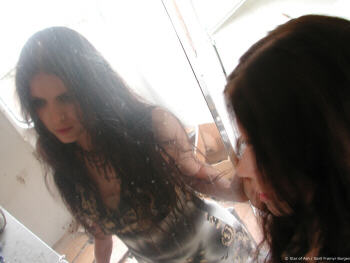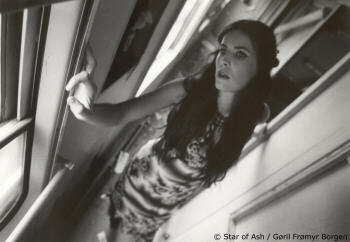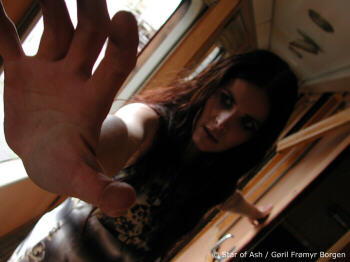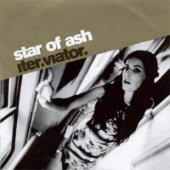Star Of Ash - Interview
Peccatum and Star of Ash have many things in common. Innovation, creativity, originality and Heidi S. Tveitan. Better known as "Ihriel" for some of you, Heidi is the mother of this wonderful offspring made of dark and mysterious landscapes called "Iter.Viator.". Open your eyes, ears and mind to a world where imagination and intellectuality meet through the music and words from this very special lady.
Denis 'Shadow'
 Can you present us the musicians and their participation?
Can you present us the musicians and their participation?
After abandoning my initial desire to make a minimalist and quiet record, I decided to bring other musicians on board to help out with some of the acoustic instruments. I ended up using a jazz drummer, three different guitarists, two male vocalists and a small choir. The songs themselves were there to start with, so it is more a matter of musical interpretation in the performance and mixing that my guests have brought with them.
Tell us a bit about the story behind the making of "Iter.Viator."
I guess it's fair to say it was more about being asked to do a solo album, rather than me deciding to open a new forum for my music. That said, it became my wish during the writing process to blend in elements which could create images. The characters in my story tend to fade into the background, leaving the settings and emotions in the spotlight. I like to think of "Iter.Viator." as a journey in the crime noir fashion; at times mingled with the feelings I detain from listening to Arvo Pärt's search for overtones in church bells. My main motivation for making music is the desire to invent stories; to release my work is to read those stories aloud. In that perspective Star of Ash is just another story, and "Iter.Viator." its first chapter.
Were you pretty confident or rather frightened about the reaction of the fans/media?
Neither. In my opinion an artist can choose to take control, stand, rise and fall with his/hers creations. Failing to seize that privilege may force the artist into a position where he/she is controlled. To elaborate I would like to use the more eloquent words of the French surrealistic writer, Georges Bataille:
"I WANT TO CARRY MY PERSON TO THE PINNACLE - If the cashier falsifies the accounts, the director is perhaps hidden behind a piece of furniture, ready to embarrass the indiscreet employee. To write, to falsify the accounts - I know nothing of this, but I know that a director is possible, and that, if he happened upon the scene, I would have no recourse other than shame. There are readers, nevertheless, who have in them anything to cause this disarray. Were the most perspicacious of them to accuse me, I would laugh: it is of myself that I am afraid".
How do you react to bad review or press?
It all depends if the review/press contains a great deal of musical insight or not and in which manner the album is dealt with. Well written and insightful reviews can be helpful to the artist whether they are positive or negative. On occasions where my music simply is not the "flavor of the day" I oftentimes find myself in the same chariot, meaning that I care as little for their flavor as they do for mine.
 "Amor Fati" by Peccatum is an incredibly good Avant-garde album and I would go as far as saying that it's the type of work that defines the genre. A true classic. With "Iter.Viator.", we have a rather unusual type of compositions and here the atmospheric meets the Avant-garde in a gorgeous way. I personally enjoyed your voice doing the lead singing and being more upfront. I never heard something like this. Can we say you have created a new genre?
"Amor Fati" by Peccatum is an incredibly good Avant-garde album and I would go as far as saying that it's the type of work that defines the genre. A true classic. With "Iter.Viator.", we have a rather unusual type of compositions and here the atmospheric meets the Avant-garde in a gorgeous way. I personally enjoyed your voice doing the lead singing and being more upfront. I never heard something like this. Can we say you have created a new genre?
Thank you for your kind words, but no, my album is too inconsistent to be groundbreaking in that sense.
Everything you and your husband do is innovative. Where do you take the inspiration to come up with all these goodies?
What seems innovative in our music is probably the result of both of us cherishing the isolation of the creative process. To us our products are our own experiments until released, thus we work isolated from outside demand and dictation. That's said, we're of course influenced by outside impressions, but we are too curious about what we have not yet done to go with the flow and easy solutions. Last but not least we're simply addicts to the thrill of experimenting! [laughs]
As a singer and musician, who are the artists you like (not only in metal)?
Arvo Pärt, Ian Gillan, A-Ha, David Bowie, Rob Halford, Diamanda Galas, Jaga Jazzist and Krøyt to mention a few.
Is there any of them you'd like or perhaps plan to work with?
Arvo Pärt is my ultimate favorite composer, and has been so for years. He is musically way out of my league though. [Laughs]
Have you ever heard of Avant-gardiste singer Monika Edvarsen?
I'm afraid not.
Is there a new Peccatum album in the making?
Yes, we're currently working on our forthcoming third full-length, which will be released sometime this year. It will be released on a different label than our previous albums. The musical direction is not fully set as yet, so we'll just have to drift with the flow and see where it takes us in the end.
How do you manage being involved with two bands at the same time?
All of us in Peccatum have other bands and commitments, so it just takes a bit of planning and mutual adjustment to make things function smoothly.
 Your lyrics are pretty dark and poetic. With memorable parts like "I yearn to vomit my heart all over you." How do you create your songs?
Your lyrics are pretty dark and poetic. With memorable parts like "I yearn to vomit my heart all over you." How do you create your songs?
I oftentimes use the piano or sequencer as a starting point in order to build harmonies, chord progressions and themes. From a rough sketch the selection of key and tempo needs to be set. Once this rough skeleton is made it is time to bring it to life, clothe and feed it. On this production the actual themes became the focus point; some of them stripped, rebuilt and rearranged many times over. The instrumentation is how I wanted to dress these themes. In other words, the instrumentation and the arrangements derive primarily from the themes themselves. My approach to music had grown more mathematical over the years, and I find it to be a time consuming puppet, hard to please and get pleased by. As for the lyrics on "Iter.Viator.", they move between the meaningful and pure nonsense. In many ways it is more about impressions rather than understanding.
Are the words put down first or do the melodies float in your mind to begin with? Tell us more about the creative process.
My work method with words varies, but in general I write the melody structure into the harmonies of the song, with or without the final lyric. I lean towards the perception that when words are used in music, both are dependant on each other and create some sort of symbiosis. However, I find music to be the most intriguing language of all; superior to any word you feed it with.
Now feel free to express any thoughts you want in this "artist final words zone".
Thank you for the interview and support.
"Life will dissolve itself in death, rivers in the sea, and the known in the unknown. Knowledge is access to the unknown. Nonsense is the outcome of every possible sense."
Fragment from Georges Bataille's "Inner Experiences".
Upcoming Releases
- Morrath - Obscure Abominations - Feb 25
- Chalice - Divine Spear - Feb 27
- Blackwater Drowning - Obscure Sorrows - Feb 27
- Vide - Aux Enfants Des Ruines - Feb 27
- The Leaving - The Leaving - Mar 06
- Serpent Icon - Tombstone Stories - Mar 06
- Insect Inside - Reborn In Blight - Mar 06
- Triumpher - Piercing The Heart Of The World - Mar 06
- Lömsk - Act II - Of Iron And Blood - Mar 06
- God Against Humanity - The Judgement - Mar 06
- Miserere Luminis - Sidera - Mar 06
- Gravemass - This Is The Way - Mar 06
- Monstrosity - Screams From Beneath The Surface - Mar 13
- Against I - Anti Life - Mar 13
- Empire Of Disease - While Everything Collapses - Mar 19
- Hanging Garden - Isle Of Bliss - Mar 20
- Putred - Blestemul Din Adânc - Mar 20
- Gaerea - Loss - Mar 20
- Diatribes - Degenerate - Mar 20
- Hegeroth - Soaked In Rot - Mar 25

